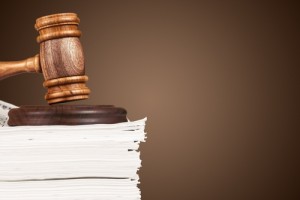Will Supreme Court adopt high-tech tools to fight security breaches?

Image from Shutterstock.
The U.S. Supreme Court could take several measures to increase security following the leak of Justice Samuel Alito’s draft opinion to Politico.
Jeff Stollman, a corporate and government information technology security consultant, told Bloomberg Law about some options that the court could adopt if they haven’t already been implemented.
One option is to use unique watermarks on paper used by each justice. Another is to use paper with “taggants,” which are microchemical markings that could trigger alarms or alerts if carried outside the building. A third is to disable laptop USB ports that would prevent copying draft opinions onto portable USB devices.
Bloomberg Law spoke with law professors about security measures that were previously instituted by the high court.
Computers used to write opinions were not connected to the internet when Brian Fitzpatrick, a professor at the Vanderbilt University Law School, clerked at the court in 2001 and 2002. Draft opinions would be printed and circulated by hard copy carried by messengers between chambers, he told Bloomberg Law.
The justices had a separate computer for internet access, according to Fitzpatrick and Stephen Wermiel, a professor at the American University Washington College of Law.
In addition, there would be records of who accesses an opinion or prints it, according to Jonathan Turley, a professor at the George Washington University Law School.
Turley also told Bloomberg Law that the court uses burn bags, which are used in the national security context to shred or incinerate sensitive documents. And the court has imposed limits on cellphones and computers.
In the past, secrecy has been reinforced among law clerks by stern lectures from justices and fear of career repercussions, according to the New York Times.
Former clerk Ian Samuel told the High School SCOTUS blog about the warning that he got from the late Justice Antonin Scalia when he began his clerkship.
“If I ever discover that you have betrayed the confidences of what goes on in these chambers,” Scalia had told Samuel, “I will do everything in my power to ruin your career.”
See also:
ABAJournal.com: “What does the original Roe v. Wade really say?”
ABAJournal.com: “What is the potential impact of the abortion case before the Supreme Court?”
ABAJournal.com: “Where are the other draft opinions in SCOTUS abortion case? So far, there are none, report says”



